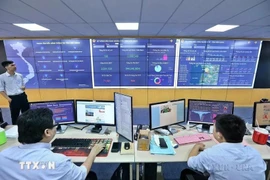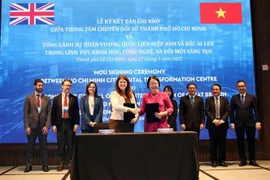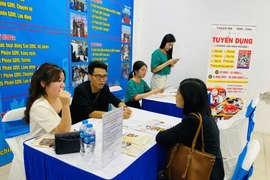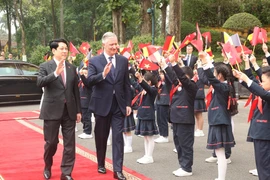London (VNA) – Unlike countries bound by historical traditions that are very difficult to change, Vietnam, as a developing country, has advantages in developing science, technology, and innovation.
This view was shared by Dr Simon Best, senior lecturer in Management and Innovation at Middlesex University, during a recent interview with Vietnam News Agency correspondents in the UK.
According to Dr Best, looking at the technological changes that are happening now, the world has gone deeply into the Fourth Industrial Revolution. Resolution No.57-NQ/TW on making breakthroughs in science, technology, innovation, and national digital transformation is a positive signal showing that Vietnam is already embracing and engaging in change.
He pointed out that Vietnam has enough enterprising and entrepreneurial people that don't need as much input from other countries in promoting innovation, recommending the country may start by looking carefully at its own resources.
Speaking about the UK’s experiences in developing human resources for science and technology, Dr Best said Vietnam can learn from problems facing UK universities in this process, pointing to a massive transition in terms of how universities can compete against other sources of information.
He said that since the creation of the internet, universities are no longer the creators, holders and disseminators of information. The internet has taken that away while higher education institutions have yet to adjust to this, and this applies to the UK and Vietnam.
He cited an example of AI, which has been around for at least five or six years, many universities in the UK don't have programmes or modules teaching students, including STEM students, the behavioural aspects of understanding AI, machine learning, automation and so on.
In order to address this, universities cannot just teach the technical aspects, Dr Best said, stressing that STEM programmes need to make sure that students have the understanding of how to apply technical knowledge as well as get additional training in things like entrepreneurship and innovation.
He also stressed the importance of cross-discipline collaboration to develop better human resources to go into industry, businesses and organisations, saying this cross-collaboration across different faculties or different expertise is crucial.
The scholar said STEM has and will underpin all development, but STEM alone is not enough, pointing out the industrial revolution was led by practitioners (engineers and business people), not researchers or academics. Therefore, ways should be found to cut across the silos in industry and academia and create cross-discipline programmes from the pre-university level to university level.
Dr Best pointed out survey after survey of all employers show that the ability to solve complex problems collaboratively are the key skills they need. In this sense, STEM students need to learn soft skills to enable them to develop critical thinking and collaboration skills to work with people from very different backgrounds.
In his opinion, to promote the development of science, technology and innovation, there should be small local hubs that bring together all different-sized businesses to explore and share IT resources and innovations while the distillation of technology from large businesses to smaller businesses (AI, machine learning, automation) should be sped up as well as incentives for smaller businesses to adopt technology should be provided.
In addition, a local-level business ecosystem map that shows how different sectors can support each other should also be built.
To promote efficient collaboration between the state, scientists and entrepreneurs, he suggested Vietnam invest in Erasmus Plus-style projects that bring together industry (both small and large) universities, and educational institutes to develop changes in the educational system.
In this mechanism, the government can invite businesses to identify issues and problems they have around developing human resources, particularly from STEM students, and also how they can collaborate more on ideas and projects. The businesses then bring their ideas to the government which then publishes them and invites universities and other companies to join the project and provide certain funds to cover the cost of running the project.
Speaking about how Vietnamese intellectuals overseas can contribute to their country, Dr Best said millions of ethnic Vietnamese all over the world are an incredible, rich, and valuable resource. He recommended the country adopt mechanisms to build relationship between the country and the overseas Vietnamese intellectual community, encouraging them to come back and engage more with the country./.
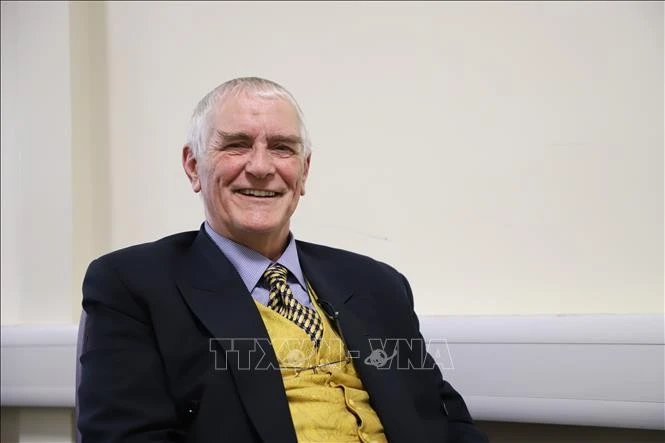
See more
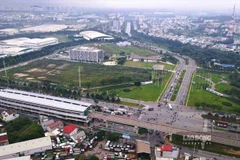
HCM City forum strengthens Vietnam’s semiconductor, high-tech supply chains
Speaking at the event, Vice Chairman of the municipal People’s Committee Vo Van Hoan highlighted that the city has established itself as an attractive destination for investments in the domains, given its complete ecosystem to develop emerging industries with sound human resources and numerous semiconductor enterprises.
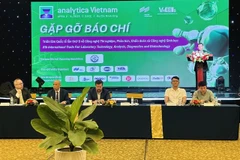
HCM City set to host laboratory expo Analytica Vietnam
Analytica Vietnam 2025, organised by the National Agency for Science and Technology Information and Statistics and Germany’s Messe München GmbH company, will showcase technologies, equipment and solutions from leading manufacturers and distributors of laboratory instruments, analytical tools and technologies.
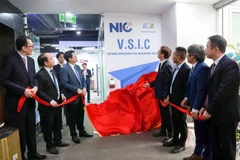
Vietnam Semiconductor Innovation Centre boots up in Hanoi
The launch of the VSIC shows a key commitment from FPT Corporation, NIC, and their partners to establish a sustainable semiconductor ecosystem in Vietnam, positioning the country as an attractive destination in this strategic industry.
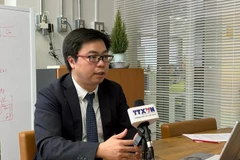
Resolution 57 to help Vietnam develop sustainably: Vietnamese intellectual in Japan
The Politburo’s Resolution 57-NQ/TW holds strategic significance as Vietnam needs to innovate its growth model, and improve labour productivity and competitiveness. It identifies science, technology, innovation and national digital transformation as the main driving force for socio-economic development, helping Vietnam escape the growth model based on cheap labour and resources, said Chairman of the Association of Vietnamese Intellectuals in Japan Dr. Le Duc Anh.
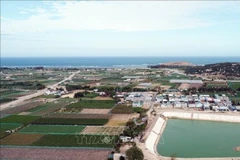
Vietnam ensures int’l commitments in nuclear power development
Vietnam, like other first-time nuclear power developers, needs to fully participate in international treaties on nuclear development, experts said.
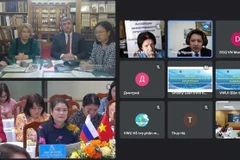
Symposium discusses ways to encourage women's engagement in science-technology
Tuyen stressed that the VWU has been carrying out practical activities to encourage women’s engagement in science and technology development, including promoting the establishment of the Vietnam Association for Intellectual Women, issuing a resolution on supporting women’s international integration by 2030, and launching initiatives like the Kovalevskaia Awards to encourage scientific research, innovation, startup and participation in digital economy and society among women.

Pilot programme allows SpaceX to provide satellite Internet services in Vietnam
This pilot programme will not impose any restrictions on foreign investors regarding ownership percentages or capital contributions, according to recently-signed Decision No. 659/QD-TTg.
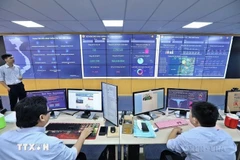
Politburo's science-tech resolution gives push to socio-economic development
Vietnam has set ambitious milestones, aiming to rank among the top three ASEAN countries in artificial intelligence (AI) research and development, digital competitiveness, and the e-government development index by 2030.
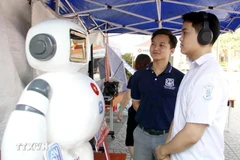
Russian expert hails Vietnam’s sci-tech development policy
Vietnam has chosen a right direction by setting the goal of making science – technology development, and innovation main driving forces for socio-economic development, said Dr. Grigory Trubnikov, Academician of the Russian Academy of Science and Director of the the Joint Institute for Nuclear Research (JINR) in Dubna (commonly known as Dubna Institute).
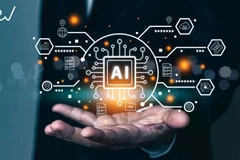
Vietnam harnesses AI to transform public services
The Government is accelerating AI application to reduce the paper workload and improve operation efficacy.

PM calls for nationwide digital literacy to empower citizens
PM Pham Minh Chinh tasked the Ministry of Science and Technology and the Ministry of Education and Training with developing a digital competency framework tailored to different groups, ensuring that civil servants, students, and workers alike have the necessary digital skills to work, learn, and engage safely and effectively in an increasingly digital world.
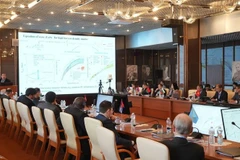
Vietnam, Russia hold promising scientific collaboration
Since 1982, when the Vietnam Academy of Science and Technology (VAST) became the official representative of Vietnam at JINR, the training of scientific personnel has been systematised, laying the foundation for the development of a high-quality scientific and technological workforce, playing a significant role in the country's renewal process.
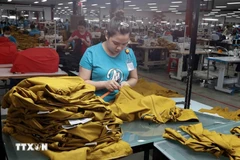
Vietnam poised for tech revolution: insights from Cambridge expert
Bang highlighted Vietnam’s advantages such as a young and tech-savvy population, steady economic growth, deep integration into global supply chains across multiple industries, and modern infrastructure like large airports and seaports.
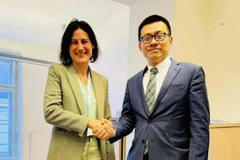
Vietnam, Austria explore cooperation in emerging technologies
Vietnam is highly interested in and wishes to strengthen partnerships with Austrian hi-tech companies, helping it make breakthrough in science, technology, and digital transformation, said Ambassador Vu Le Thai Hoang.
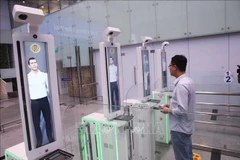
Preparations underway for biometrics, VNeID application at six airports
The biometric system is set for deployment at Tan Son Nhat between April and June, while at Noi Bai between March and September.
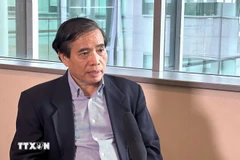
Expert taps Singapore’s model for Vietnam’s digital revolution
An expert from Singapore’s Lee Kuan Yew School of Public Policy has shared some of the city-state's experiences in how to promote science, technology, innovation, and digital transformation for national development.
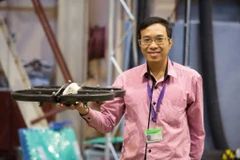
Vietnamese-Australian engineer takes agriculture sky high with drone technology
The aeronautical engineer described the Politburo’s resolution on breakthroughs in science, technology, innovation, and national digital transformation as a bright spot, removing obstacles for both domestic and foreign technological talent to make contributions to the homeland.
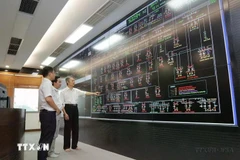
Resolution 57 shapes way for Vietnam to become science-technology leader
The ambitious targets outlined in the resolution are based on both Vietnam’s current capabilities and its future development potential. However, achieving these goals requires breakthrough approaches to implementing science, technology, innovation, and digital transformation.
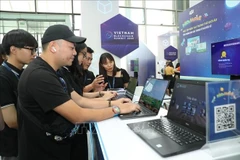
Scientists in UK lauds Vietnam’s resolution on science, technology
Evaluating the significance of Resolution 57 in the current development phase, the scientists agreed that investing in science and technology is the right direction to create momentum for the country’s breakthrough development.

Report flags gaps in Vietnam’s AI push in public sector
A report funded by UNDP and conducted by the Institute for Policy Studies and Media Development (IPS) found that 87% of AI-integrated public sector projects remain dormant, while 70% of surveyed businesses and organisations rated their AI efforts as minimally effective.
